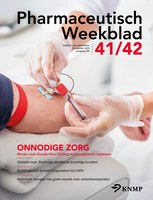Dabigatran: 12% therapieontrouw
PW Magazine 32/33, jaar 2013
-
06-08-2013
De veronderstelling dat therapietrouw in klinisch onderzoek altijd beter is dan in de dagelijkse praktijk, is niet altijd waar.
Onderzoekers uit Canada, die deze opvatting nader toetsten, keken naar de therapietrouw van 103 patiënten die ten minste drie maanden het nieuwe orale anticoagulans dabigatran gebruikten [J Thromb Haemost. 2013;11:1295-9].
Therapietrouw werd bepaald op grond van interviews en aflevergegevens. De gemiddelde therapietrouw week niet af van die in de grote fase-III-studie RE-LY. Slechts 12% werd als onvoldoende therapietrouw beoordeeld.

Wie verhaspelt toch de stukjes voor het PW?
'Slechts 12% '. Slechts is een interpretatie. Er staat 12%.
Verder is de conclusie die getrokken wordt niet juist:
NA de studie doen de mensen die aan de studie RE-LY meegedaan hebben het,wat betreft therapietrouw, niet beter dan de mensen die niet aan de studie hebben meegedaan. Zo staat het in de samenvatting en niet anders. ('study-experienced' tegenover 'study-naïve patients')
Lees het zelf maar even, ook over de gemelde complicaties. Summary
Background
In clinical trials, adherence to a prescribed regimen with dabigatran was enhanced by frequent follow-up visits and pill counts.
Objectives
To describe the experience of dabigatran treatment in clinical practice, focusing on adherence.
Patients/methods
In a cross-sectional cohort study, we interviewed 103 patients treated for at least 3 months with dabigatran and followed by our anticoagulant clinic. We obtained information on the number of capsules of dabigatran dispensed by the pharmacy of each patient covering the entire treatment period and calculated the adherence. In addition, information on the frequency of missed capsules, bleeding, thromboembolic events and other adverse events, specifically dyspepsia, was captured from the interviews and medical records.
Results
The mean age was 75.5 (± 8.5) years, 46% were females, and the mean CHADS2 score was 2.5. Dispensation data were obtained for 99 patients and adherence was 99.7% (median; interquartile range 94.6%–100%) with 11 patients showing < 80% adherence. During their interview, 31 patients (30%) acknowledged that they sometimes had missed taking the medication, ranging from ‘twice in 6 years’ to ‘every day’. One additional patient with adherence < 80% was identified. Twenty-one patients (20%) reported bleeding complications, two of which were major; one patient had an ischemic stroke and 34 (33%) reported some degree of dyspepsia. There were no significant differences in the results between RE-LY study-experienced and study-naïve patients.
Conclusion
In our clinical practice adherence to the twice-daily dabigatran regimen was generally good, although 12% of the patients had an inadequate adherence. Routine feedback from the pharmacies could inform the physician to improve the anticoagulant management.